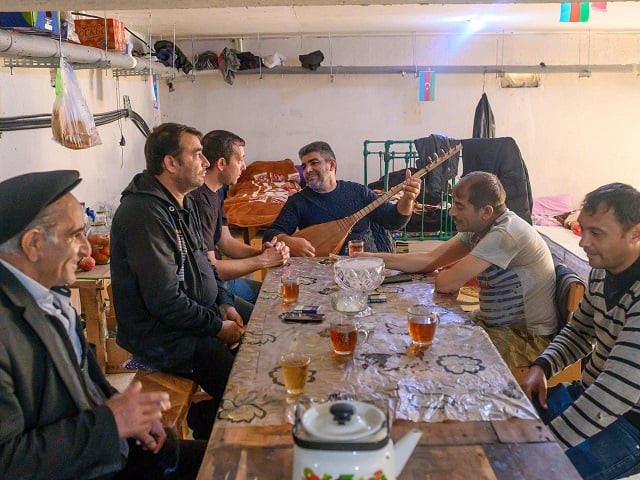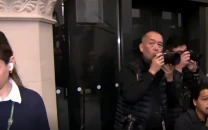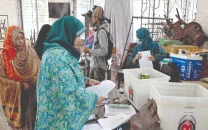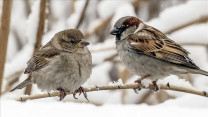Virus secondary as civilians try to survive Karabakh battle
The escalation has so far killed more than 800 people on both sides since erupting on September 27

Two ripe squashes sit under a chair in a basement sheltering Azerbaijanis from the shells falling along the Nagorno-Karabakh frontline.
As he hunkers down in his underground refuge, Ayden Shakhverdiyev boasts that the vegetables are one of the best remedies he knows for fighting the coronavirus.
"They grow in our garden," declares the 54-year-old.
"We slice them up, sprinkle it with sugar. We let it stand for a week, 10 days, and eat. It is very healthy. It is the best thing there is against the coronavirus."
Even in the Azerbaijani town of Teter, on the frontline of fighting over Nagorno-Karabakh and repeatedly hit by Armenian shelling over the last days, the coronavirus is a threat that is far from forgotten.
For decades Armenia and Azerbaijan have been at odds over the status of the region, internationally recognised as part of Azerbaijan but declared as independent by breakaway Armenian separatists.
Fighting has flared sporadically since a 1994 ceasefire ended the war that followed the break-up of the Soviet Union. But this escalation - which has killed more than 800 people on both sides since erupting on September 27 - is the first in pandemic times.
No borders
The World Health Organisation has expressed concern that the bloodshed will crush the underdeveloped health care systems and speed up the spread of the respiratory disease.
"As we have been repeatedly saying, Covid-19 does not respect borders or lines," WHO spokesman Tarik Jasarevic warned last week.
The concern appears to be justified.
Azerbaijan was recording fewer than 150 daily infections between the start of September and mid-October. The daily case load shot past 600 this week.
President Ilham Aliyev has responded by shutting down the capital Baku's subway system and closing all schools and universities for the coming two weeks.
The families living in the basements of the flashpoint town of Terter are also trying to do all they can to ward off the health threat.
But their resources are meagre and home remedies passed down for generations are still trusted -- even if squash is not a Covid-19 miracle cure.
"We worry about the coronavirus and we worry about the fighting," local school principal Vafadar Aliyev said as the basement's residents hunkered down for lunch.
"We are trying to live in between the two," he told an AFP team granted access to frontline areas by the Azerbaijani government.
Two fronts
Masks and social distancing measures seem of secondary importance to people with destroyed homes and limited supplies of food.
Terter's basement dwellers only go up to their apartments -- many of them with their outer walls blown out and scattered with waist-high debris -- to shower and heat up some food.
They then run back down to cement basements equipped with cots and mattresses scattered along walls.
Their contact with the outside world is mostly limited to visits from government aid workers and a few relatives from surrounding villages who drop by to help out.
But the threat of one person spreading the virus to everyone else in the basement is high.
The basements have no running water and hygiene is limited to occasional splashes of disinfectant.
"When possible, we try to keep this place clean," said Rustam Aliyev after casting a shy glance at the basement's growing collection of emptied juice and water bottles.
Two rusted pots stand next to them on the cement floor and some shirts and trousers hang off a water pipe running under the ceiling.
"We are taking all the measures we can."
Yet with 60 Azerbaijani civilians killed in the fighting so far, according to Baku, the desire to survive the bombardments outweighs fear of the virus.
According to Yerevan, 36 Armenian civilians have been killed in the fighting, with aid organisations warning that the pandemic means this is the worst possible time for the conflict to spiral out of control.
"The virus is secondary. All our attention is on the war. All our attention is there," said Khidgeran Amrakhova, the basement's lone female resident.
Amrakhova's neighbour Rasul Aliyev agreed.
"We are trying to avoid being killed by the Armenians more than catching coronavirus," he said.



















COMMENTS
Comments are moderated and generally will be posted if they are on-topic and not abusive.
For more information, please see our Comments FAQ